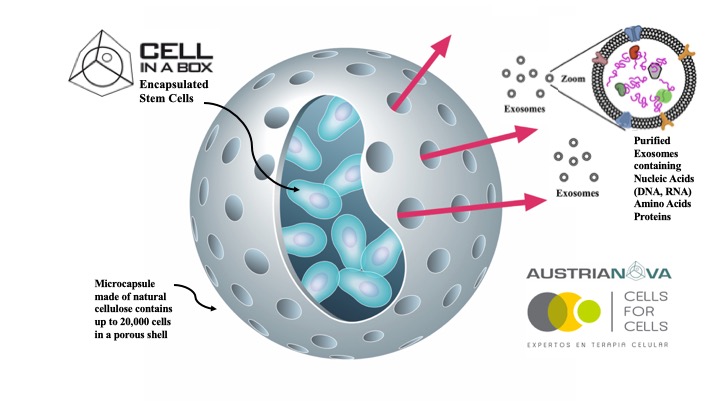Austrianova and Cells for Cells have just jointly published a ground breaking, peer reviewed, scientific publication on a novel, cost and time-saving method to generate extra-cellular vesicles (EVs) from encapsulated Mesenchymal Stem Cells (MSCs). These EVs are known to mediate many of the therapeutic effects of stem cells. The authors show that Austrianova’s proprietary Cell-in-a-Box encapsulation technology can be used to produce and deliver EVs from encapsulated MSC’s, as demonstrated using Cells for Cells proprietary MSCs.
Currently, EVs have to be purified from cell culture conditioned media using tedious, costly and time-consuming protocols that are difficult to perform under Good Manufacturing Practices (GMP) conditions. The Cell-in-a-Box encapsulation technology allows efficient enrichment of EVs at high concentration since they are released from the encapsulated cells via the semipermeable pores, which selectively enable the release of small particles but not of the MSCs. Moreover, Cell-in-a-Box provides 3D culture conditions for the MSCs. The technology can be used in cell culture allowing GMP production. Alternatively, the encapsulated cells can be implanted into patients as a retrievable delivery device that shields the cells from clearance, whilst they continuously produce EVs, growth factors, hormones and other small therapeutically relevant molecules. Moreover, the EVs produced after encapsulation can themselves be used as drug-loaded delivery vehicles. This technology will be invaluable for the treatment of regenerative diseases and Inflammatory disease.
Maroun Khoury, CSO of Cells for Cells said “this is a multifaceted project bringing together different expertise to support the burgeoning field of EV-based therapies. It will be interesting to test in the near future, the continuous release of EVs in a in vivo context. At a personal level, it was a great way to stay connected with colleagues that I met while living in Singapore ”.
Brian Salmons, CEO of Austrianova said “we are pleased that these results representing the culmination of a long term project with our colleagues at Cells for Cells are finally publicly available. The encapsulation of stem cells as a means to produce exosomes using our Cellin-a-Box is an exciting technological breakthrough that is applicable for all stem cell types.”

